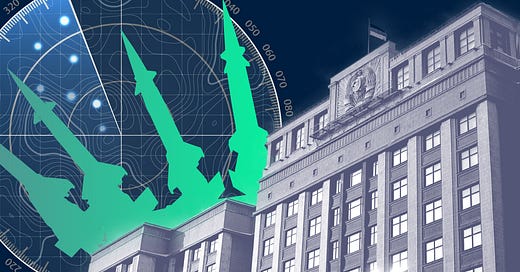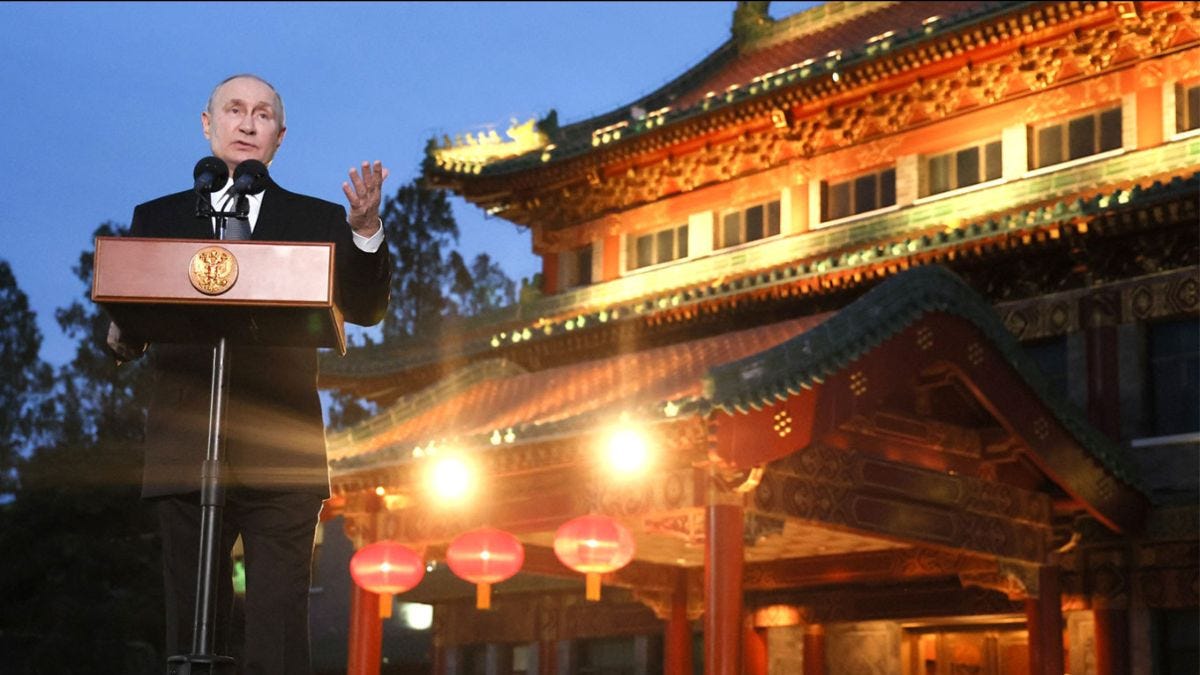Duma See, Duma Do
The State Duma unanimously voted to rescind Russia’s ratification of the Comprehensive Nuclear Test Ban Treaty.
Hello from the Bear Market Brief!
This week in the news:
The State Duma unanimously voted to rescind Russia’s ratification of the Comprehensive Nuclear Test Ban Treaty.
The State Duma adopted in the first reading a law granting governors the right to dismiss mayors in their regions.
President Putin signed a presidential decree containing measures to strengthen the ruble.
Ukrainian forces used American Army Tactical Missile Systems to strike two air bases in temporarily-occupied Berdiansk and Luhansk.
Comprehensive Nuclear Test Ban Treaty
The State Duma unanimously voted to rescind Russia’s ratification of the Comprehensive Nuclear Test Ban Treaty (CTBT) this week. Russia ratified the CTBT in 2000 after it was adopted by the UN General Assembly in 1996. However, the Treaty never formally entered into force; only 36 of the 44 required “nuclear capable states” ratified it. Although the U.S. signed the treaty, it is among the eight states who did not ratify.
This February, Putin said that if the U.S. began testing new types of nuclear weapons, Russia would do the same. On October 5, at the Valdai Discussion Club, Putin signaled that Russia would be withdrawing from the CTBT and announced the successful testing of the Burevestnik nuclear-powered missile. Immediately afterwards, State Duma Speaker Vyacheslav Volodin began the process of officially revoking Russia’s ratification. The resulting bill was co-authored by almost all of the deputies in the Duma and passed unanimously in its first reading on October 17. The bill was again passed by all 415 deputies present during its second and third readings the next day. In his remarks, Volodin blamed the U.S. for precipitating Russia’s de-ratification. “For 23 years we have been waiting for the United States to ratify this Treaty (CTBT). But Washington, due to its double standards and irresponsible attitude towards global security issues, did not do this,” he said. The bill now needs to be approved by the upper house and signed by Putin to officially enter into law.
Despite de-ratifying the CTBT, Kremlin spokesman Dmitry Peskov said that Russia has no intention of conducting nuclear tests. Leonid Slutsky, the head of the State Duma Committee on International Affairs, reiterated this; Russia “will continue to fulfill all its obligations under the treaty, as well as observe a moratorium on nuclear tests,” he said. He called Russia’s de-ratification a “mirror response” to U.S. behavior and said that Russia is only protecting its national interests.
Although Russia may not be rushing to conduct nuclear tests, de-ratification of the CTBT is part of a concerning trend. In February of this year, Russia withdrew from New START, a treaty with the U.S. limiting the number of nuclear warheads each country could deploy, and, in June, Putin confirmed that Russia has sent tactical nuclear arms to Belarus. While this latest move may not signal a new arms race, experts warn that it does weaken the global consensus against nuclear testing. Robert Floyd, Executive Secretary of the CTBT Organization, agreed. “I urge leaders in Russia to consider a different path, one which reinforces global commitment to ending nuclear testing,” he tweeted.
— Sara Ashbaugh, Editor in Chief
Snapshot
President Putin visited China this week to meet with his counterpart Xi Jinping and discuss strengthening ties between Russia and China. Putin was invited along with representatives of 129 other countries for the Belt and Road Initiative (BRI), a Chinese global infrastructure project. While Putin praised the “unprecedented high level” of energy cooperation between the two countries, no major deals were reached during his visit. (photo: Sergei Savostyanov, TASS / kremlin.ru)
A Secretive Decree
On October 11, President Putin signed a presidential decree containing measures to strengthen the ruble. The decree makes it obligatory for 43 Russian exporters to deposit 80% of their foreign currency income with Russian banks and sell at least 90% of this for rubles on the domestic market. The ruble reacted positively to the decree, which came into force on October 16. However, the Presidential Administration did not publish the names of the 43 affected companies, as journalist Farida Rustamova noted, nor is it planning to do so.
The reason for the secrecy is unclear. It is possible that the government is trying to limit the effect of the decree on whole sectors, as it is likely putting pressure on companies that it suspects have a large amount of unsold forex earnings. Keeping the decree secret also limits companies’ lobbying power to end the (ostensibly temporary) capital controls, as they cannot be sure which other companies are on the list.
Inflation seems to remain the biggest concern of the authorities before the presidential election planned for March 2024. However, the government’s draft federal budget also counts on a relatively weak ruble in order to support higher spending on the military. The average 2024 exchange rate is 90 rubles to the dollar, but this supposes that the Central Bank remains fully in control of the situation. This decree is another example of the short-term thinking that increasingly defines the Russian government's policymaking; it takes surplus profits whenever and wherever they appear in Russia’s rapidly transforming economy to spend on reducing short-term political risks or feeding its war machine.
— Andras Toth-Czifra
Graph
This graph shows the damage caused by the destruction of the Kakhovka Dam on June 6, 2023 divided by sector. The data was compiled by the UN and the Government of Ukraine for the Post-Disaster Needs Assessment of the Kakhovka Dam Disaster (PDNA) that was published this month. According to the assessment, the largest share of damage was done to the energy sector ($1.26 billion), followed closely by housing ($1.1 billion). In addition to the $2.79 billion in direct damage, the PDNA estimates an additional $11 billion in losses, including a substantial environmental impact. (graph: Government of Ukraine and the United Nations)
Ukraine Uses ATACMS
On Tuesday, Ukraine’s forces used recently-supplied American long-range Army Tactical Missile Systems (ATACMS) to strike two air bases in temporarily-occupied Berdiansk and Luhansk. Ukraine’s Special Operations Forces reported that this attack damaged air base runways and destroyed nine helicopters, an ammunition depot, an anti aircraft missile launcher, and other military equipment. Additionally, dozens of Russian military members were killed or injured as a result of these strikes, according to Ukrainian sources. The Russian Ministry of Defense has not commented on the attacks.
Ukrainian President Volodymyr Zelensky confirmed the use of ATACMS during his address to the nation. “Today I am especially grateful to the United States. Our agreements with President Biden are being implemented. And they are being implemented very accurately—ATACMS have proven themselves,” Zelensky said. The White House also confirmed the transfer of the missiles to Ukraine. “We believe these ATACMS will provide a significant boost to Ukraine’s battlefield capabilities without risking [US] military readiness,” said National Security Council spokesperson Adrienne Watson.
The decision to send the missiles represented a shift in the Biden Administration. President Biden has previously expressed concerns that sending ATACMS to Ukraine could escalate the conflict with Russia. According to U.S. officials familiar with the matter, fewer than a dozen missiles were delivered to Ukraine within the last few days. This provided Ukraine with the critical ability to reach Russian bases used for air support and supplying their troops in Ukraine. Ukrainians, however, may not use ATACMS to launch attacks on Russian territory, one anonymous U.S. official said.
— Lisa Noskova
On the Podcast
Politically and socially, how are Ukrainians contending with a difficult, long war? Fabrice Deprez joins from Kyiv to give us an update.
Quickfire: Regions
The head of the Khanty-Mansi Autonomous Region, Natalia Komarova, faced accusations of “discrediting the military” after she (answering a question from her audience at an event) said, “we did not need the war [in Ukraine]” and Russia was unprepared. Komarova also suggested that governors should not be held responsible for the poor equipment of mobilized soldiers, and these complaints should be addressed to the Ministry of Defense. This is not the first time that Komarova has inadvertently said something that she was not supposed to; in January 2023, she casually described corruption in her region’s public investment projects on a hot mic. It is also unlikely that she will be held legally responsible for “discrediting the army” as others would likely have been in her place, although rumors quickly started about her imminent dismissal. However, the fact that Komarova seems to be venting frustration over being made responsible for an issue she claims to have little control over is notable in itself, as this is exactly how the Kremlin’s domestic crisis management system, tested under the COVID-19 pandemic and further perfected during the war, is supposed to work.
Komarova is not the only governor who is facing heat from the relatives of mobilized soldiers. Idel.Realii reported that residents of Udmurtia called on the region’s governor, Alexander Brechalov, to help bring mobiks back home. Such requests have skyrocketed following last month’s announcement that mobilized soldiers would not be rotated out of Ukraine before the end of the “special military operation.” Soldiers also report that their leave requests are often turned down. At the beginning of October, the social network VK reportedly started blocking posts demanding the return of soldiers from the front.
At a meeting in Ulan-Ude, the capital of Buryatia, Duma Speaker Vyacheslav Volodin signaled that the government might compromise on the issue of the new law on Lake Baikal, adopted in the first reading in July. The bill, in its original form, allows clear-cutting in the central ecological zone of the natural reserve surrounding Lake Baikal for the purposes of building roads and other infrastructure. It is this provision that Volodin now says the government could concede on. The draft led to protests in Buryatia, even as officials in the regions have been pushing for its adoption. The government’s reaction suggests that even as Russia’s forced pivot to Asia makes large-scale infrastructure projects necessary in Siberia and the Far East, the authorities want to avoid forcing decisions that may galvanize protests in the regions.
— Andras Toth-Czifra
Quickfire: Ukraine
The U.S. military confirmed on Monday that all 31 U.S.-made Abrams tanks promised to Kyiv by Washington have arrived in Ukraine. “We have lived up to our end of the bargain. From this point forward, it is up to [Ukraine] to determine when and where they will deliver this capability,” Colonel Martin O’Donnell, a spokesman for the U.S. Army Europe and Africa, told VOA. Colonel O’Donnell added that Ukrainian service members completed training on operating the tanks in Germany and returned to Ukraine, along with ammunition and spare tank parts.
The UN recently released the Post Disaster Needs Assessment to evaluate the extent of the damage and losses incurred as a result of the Nova Kakhovka Dam’s destruction in June 2023. The report findings show that infrastructure and assets incurred about $2.79 billion in direct damage with the energy ($1.26 billion) and housing ($1.1 billion) sectors hit the hardest. Total losses exceed $11 billion. The assessment estimates the total recovery and reconstruction needs to be approximately $5.04 billion, with $1.82 billion required in the near term.
— Lisa Noskova






